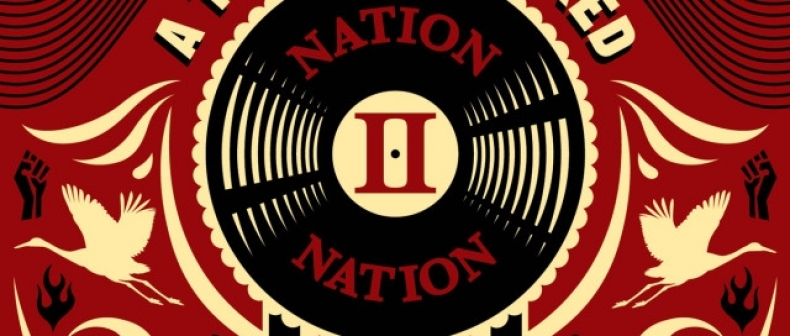
On July 16th, the Polaris Prize short list was announced, a moment of great celebration and despair. While the long list announcement focuses the potential of the list down to forty exceptional choices, it still comes across as a moment of vast potential. There is a nebulousness sense of possibility about the long list, the giddy sense that anything can happen, that the record you adore and fought for and got into hilarious online arguments about might just take it all. In contrast, the short list often comes across as reality imposing itself once again, a limiting of that potential back to just ten possibilities. It is a product of compromise, when the voices and votes of the over 200 jurors must be narrowed down and distilled into a few hotly contested pieces of common ground. It is frustrating, rage-inducing, and absolutely necessary.
While the short list announcement is notorious for bringing a time of wailing and gnashing of teeth in its wake, this year’s ten nominees are incredibly strong. While there are a few bright lights missing in this critic and juror’s opinion (KEN Mode? Anciients? Evening Hymns? Majical Cloudz?), the fact that my short list would have looked very different doesn’t change the fact that what is here is excellent, and speaks very well to the broadening tastes and increasingly open minds of the jury. While there are still some sleek, safe indie rock selections looming around the edges of the list, there is also enough of the weird and surprising to give this list some great potential.
A Tribe Called Red — Nation II Nation
While their first record showed intense potential, and earned them a place on last year’s long list, their second effort is the realization of much more of their vision; a more cohesive, cogent effort as well as a more compositionally sophisticated one. Their “electric pow-wow” fuses dance beats with Aboriginal instrumentation, song structures and vocals into an exceptional sound. Not to mention that Nation II Nation represents some of the most deeply moving music on the list in the physical sense: there is an irresistible pull to this record, an urgency that demands the listener respond with movement. Having become a voice for the Idle No More movement, A Tribe Called Red also have an deep and intelligent political sensibility. They directly and fearlessly engage with concepts from the inherent politicization of Aboriginal bodies, to the problems of white fans wearing headdresses and war paint to their shows. They also have a strong feminist impulse, which is demonstrated in songs like “Sisters” wherein they chose to use pow-wow tracks where women’s vocals appeared on a separate track, allowing women’s voices to take centre stage in a way that they never do in traditional pow-wow, to be heard and presented differently. Nation II Nation is insistent, enveloping and joyous
Colin Stetson — New History Warfare Vol. 3: To See More Light
Since first hearing this record I have struggled with how to describe it, how to talk about it, what to do with it. It’s not an album, it is a living thing; weird, beautiful, and not without menace. I’ve been consistently afraid that it is changing me on some kind of biochemical level, replacing my lungs with gills. I’m going to shamelessly repeat a description I wrote in an e-mail of New History Warfare Vol. 3: To See More Light, trying to put it into words: there is a phenomenon associated with PTSD where sufferers continue to carry psychological tension around in their muscles. During trauma, muscles contract more deeply and much harder than usual, in an attempt to protect the vulnerable parts of the body — your muscle tried to become armour. Sometimes, these muscles never let go, and keep carrying the tension, the trauma, with them. It takes very deep relaxation techniques, or very aggressive forms of massage and other treatment, to let these muscles go, and often the process of releasing this tension causes memories to flood back, for trauma to be experiences fresh, or for psychological healing to begin.
To See More Light punches me in all the trauma and tension I have been carrying in my neck and back and stomach for years, and never realized it was there until forced to let it go.
Godspeed you! Black Emperor — Allelujah! Don’t Bend! Ascend!
The fourth full-length and first release in ten years from the post-rock evangelists is a monolith. Anxious and uncomfortable, Allelujah! Don’t Bend! Ascend! is a writhing mess of noise with moments of startling sublimity. A kind of clutching intimacy defines this record in the way that the chillier, more robotic distance of their work in the last decade could not. “Mladic” in particular is like a gathering cloud, but while in the past this might have seem to herald an end of the world scenario, there is now something distinctly post-apocalyptic about their sound, as though the end has already come and not the question is a struggle for survival rather than a race towards any kind of salvation. There is something almost cybernetic here, and uncomfortable fusing of harsh, sparkling metal with flesh.
Metric — Synthetica
Maybe it’s not cool to like Metric anymore, with their silvery pop as drinkable as something triple filtered and served on ice. Synthetica is something easy and familiar, unquestionably good, something that is easy to dismiss or take for granted. That doesn’t make Synthetica a less excellent record, or take away from the fact that their most intimate offering ever, exposing more of the raw nerve under the pearly whites. I’m a fan of difficult music, of twist and torque, the bent and the wounding, but while the damage this does might be superficial, you can’t discount something just because it doesn’t disembowel or sever limbs.
METZ — METZ
I’ve been too hard on METZ since their self-titled debut appeared, like a parent pushing a talented child too hard. I appreciate what they do so deeply that I want them to do even better. Their hissing, searing and sometimes spastic noise rock is both frustrating and refreshing a harrowing listen that consistently comes so close to being utterly terrifying without ever pushing the listener all the way over into the abyss. This conscious exertion of control, however, has ended up being the key to their appeal, offering listeners a dip in the lake of fire rather than forcing them to commit to eternal damnation. Sometimes grave and gangrenous, elsewhere almost immature in their wailing chaos, METZ have a spitting, surly, fighting chance.
Purity Ring — Shrines
The thing with Shrines is that it is just so damn poetic. This is the record equivalent about that guy you know is a bad idea at a hundred paces, but he brought you sushi and smells so good and has read all the sci-fi you have and — crap. It’s not the production that slays me, as it swings between the winsome and magical and sheer annoyance, but the language, delivered in the processed and high-fructose-corn-syrup tones of Megan James, is unmercifully gorgeous. In “Saltkin,” when she sings “The crawling animals will seek all things warm all things moist, I will relentlessly shame myself,” my mental armour gives way like wet cardboard.
Tegan and Sara — Heatthrob
So this is the one that I really don’t understand. I mean, I get it, I think. Heartthrob does an excellent job portraying the intensity and constant state of being overwhelmed that defines so much of being a teenager, not so much the angst but the slogging difficulty of keeping your head above your own suddenly sentient and hostile emotions, all while negotiating and defining and wrestling with sexual identity. I appreciate and am grateful for that. There’s a sweetness to the execution, though, that puts it firmly outside of the realm of my own experience, knocks out some of the identification and catharsis for me. Though I appreciate not everyone’s teen years were defied by quite so much barbed wire and industrial wasteland as mine.
Whitehorse — The Fate of the World Depends on This Kiss
As comforting as the release of violence can be, sometimes it’s not right. Sometimes you need to hold it all in, settled down with a good, deep ache and let is fester. That slow burn, pressing a cigarette into an arm or tongue into the socket of a rotten tooth, is the calibre of welcoming anguish to The Fate of the World Depends on This Kiss. The yearning is uncut and plaintive, the desire served rare and bleeding. The harmonies wrought by the unsheathed voices of Luke Doucet and Melissa McClelland are heart wringing. A record full of distilled want and so few precious drops of satisfaction.
Young Galaxy — Ultramarine
It’s harder to listen to Ultramarine now that the deep swelter of summer seems to be trying to render the fat from my body with ever outdoor step I take and being in the air conditioning has an almost sexual intensity. Because Ultramarine is not about deep, hostile heat, it’s about cool sweet air and breezy freshness, movement and ease. There are complexities to it, of course, what seem like small eddies on the surface that hint at rich blue depths. If a kindly robot wrote a love record for you, this is what it would sound like, conjuring the most supreme late-spring day, electronics evoking fingers of wind through a beloved’s hair.
Zaki Ibrahim — Every Opposite
My god, her voice. Her tone is so rich is has mouthfeel, luxurious and melting. The record is unquestionably savoury, with a sumptuous gravity and global palate. Over a core of soulful R&B, Canadian-born and South-African-based Ibrahim has layered deep and glittery pop, ritualistic chanting, disco effervescence, hip hop confidence and a post-dubstep futurism. And my god, her voice.
Of course the list is imperfect. Of course many members of the jury (to say nothing about music fans in general) are going to be unhappy with the general consistency of the list and outraged that their favourite record did not make the cut. I feel that ache too. But what is remarkable, and borderline miraculous, is that the list exists at all, that out of the process any kind of a winnowing down can take place in any capacity. Out of the roiling, argumentative, deeply opinionated and passionate pool of well over 200 jury members, there can be enough common votes and thoughts that a few records do emerge as short list candidates. That’s magic.
____
Natalie Zina Walschots is a poet and music writer based in Toronto, Ontario. Her second book of poetry, DOOM: Love Poems for Supervillains, was published by Insomniac Press this spring. You can follow her on Twitter at @NatalieZed.
For more, follow us on Twitter at @torontostandard, and subscribe to our newsletter.














